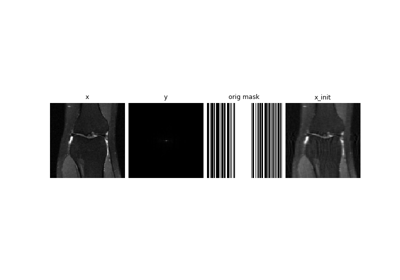GaussianMaskGenerator
- class deepinv.physics.generator.GaussianMaskGenerator(img_size: Tuple, acceleration: int = 4, center_fraction: float | None = None, rng: Generator | None = None, device='cpu', *args, **kwargs)[source]
Bases:
RandomMaskGeneratorGenerator for MRI Cartesian acceleration masks using Gaussian undersampling.
Generate a mask of vertical lines for MRI acceleration with fixed sampling in low frequencies (center of k-space) and Gaussian undersampling in the high frequencies.
The high frequences are selected according to a tail-adjusted Gaussian pdf. This ensures that the expected number of rows selected is equal to (N / acceleration).
Supports k-t sampling, where the Gaussian mask varies randomly across time.
The mask is repeated across channels and randomly varies across batch dimension.
Algorithm taken from Schlemper et al. A Deep Cascade of Convolutional Neural Networks for Dynamic MR Image Reconstruction.
For parameter descriptions see
deepinv.physics.generator.mri.BaseMaskGenerator
- Examples:
Gaussian random k-t mask generator for a 8x64x64 video:
>>> from deepinv.physics.generator import GaussianMaskGenerator >>> generator = GaussianMaskGenerator((2, 8, 64, 64), acceleration=8, center_fraction=0.04) # C, T, H, W >>> params = generator.step(batch_size=1) >>> mask = params["mask"] >>> mask.shape torch.Size([1, 2, 8, 64, 64])
- get_pdf() Tensor[source]
Create one-dimensional Gaussian probability density function across columns, ignoring any fixed sampling columns.
Add uniform distribution so that the probability of sampling high-frequency lines is non-zero.
- Return torch.Tensor:
unnormalised 1D vector representing pdf evaluated across mask columns.
Examples using GaussianMaskGenerator:

Self-supervised MRI reconstruction with Artifact2Artifact
